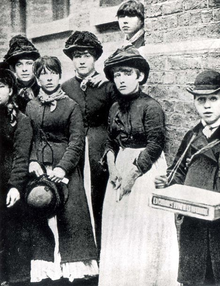29-08-2018, 11:50 AM
1
The Victorian Era
THE VICTORIAN ERA AS A GOLDEN AGE FOR THE ELDERLY: New evidence on employment, retirement and pensions for the over sixties.While old people lead healthier and longer lives today than they have ever done, it would be wrong to conclude that their counterparts in Victorian Britain were largely condemned to lives of pain and poverty. According to new research by Tom Heritage, to be presented at the Economic History Society’s 2017 annual conference, they had a wide range of experiences, and many had access to employment opportunities and sources of assistance that are no longer offered.
Analysing census data for five counties across England and Wales from 1851 to 1911, his study reveals a reciprocal relationship between those living in old age and wider society. A substantial proportion of men and women aged 60 and over were in employment. And as early as 1891, over 13% of old men were described in the census as ‘retired’: while retirement was only an option for those who had inherited or managed to accumulate wealth, more old people retired than went into the workhouse.
The author concludes: ‘In terms of present-day policy, we might learn something from our Victorian forebears about ways to integrate the general population in their sixties into the workforce so that they can contribute to society as well as receive welfare'.
More…
The author explains the findings study in more detail:
For far too long, our elderly ancestors have been viewed through the prism of the National Health Service and the modern welfare state: old people are regarded as a burden, taking out of society rather than contributing. In contrast, my study of census data for five counties across England and Wales from 1851 to 1911 reveals a reciprocal relationship between those living in old age and wider society.
First, across the whole period, 86-93% of men aged 60 and over were in employment. Even if we exclude those in workhouses, the figure is 80-85%.
Most old men worked in agricultural and general labouring, although an increase was evident by 1911 in the mining industry in Glamorgan and metal manufacturing in Sheffield. Bricklaying, house painting, dock labouring and commercial sales were also pursued in urban areas. Labour force participation rates were higher among men in their sixties than among men in their seventies and eighties.
Second, from 1851 to 1911, between a sixth and a third of women aged over 60 were in employment. Although their occupations were less diverse than those of men, the majority were based in domestic service.
Old women were also involved in cotton and silk textiles and in the manufacture of straw hats. Over time, though, the employment rates of old women did not increase like those of men, owing partly to foreign competition in Asian straw imports and French silks.
Third, retirement was not an innovation brought about by the creation of old age pensions. As early as 1891, over 13% of old men were described in the census as ‘retired’, with high rates in the areas favoured by today’s retirees: the coastal areas of Christchurch and Portsmouth in southern England. More old people retired than went into the workhouse.
But retirement was only an option for those who had inherited or managed to accumulate wealth, such as former smallholders, grocers, innkeepers, civil servants or military officers. Others who lacked land or capital, for example, agricultural labourers, or boot and shoemakers were forced to resort to the Poor Law.
Even then, this did not always, or usually, mean the workhouse. Welfare assistance to old people in their own homes was common, especially for women. ‘Outdoor relief’, usually around 2s 6d per week, was issued as a weekly ‘pension’.
Moreover, the women who received it were not always as old as those entitled to a pension in the modern era: in Yorkshire in 1891, over 10% of old women described as ‘on relief’ were under 66, which will be the minimum pension age for women by 2020.
So is it really true to say that nowadays, ‘the elderly have never had it so good’? In a sense, it is, as old people lead healthier and longer lives today than they have ever done.
But it would be wrong to conclude that old people in Victorian times were largely condemned to lives of pain and poverty. They had a wide range of experiences, and many had access to employment opportunities and sources of assistance that are no longer offered.
In terms of present-day policy, we might learn something from our Victorian forebears about ways to integrate the general population in their sixties into the workforce, so that they can contribute to society as well as receive welfare.
Tom Heritage
University of Southampton
29-08-2018, 12:06 PM
3
Re: The Victorian Era
Originally Posted by shropshiregirl
->
Hi Sweetie, Interesting facts. It makes one think how things have become worse in some aspects instead of better for the elderly!
29-08-2018, 12:13 PM
5
Re: The Victorian Era
Originally Posted by tarantula
->
Women were regarded as less than equal to the male of the species in the Victorian era , it is certainly not time in which I would have wished to live.29-08-2018, 01:21 PM
6
Re: The Victorian Era
Originally Posted by Sweetie pie
->
THE VICTORIAN ERA AS A GOLDEN AGE FOR THE ELDERLY: New evidence on employment, retirement and pensions for the over sixties.While old people lead healthier and longer lives today than they have ever done, it would be wrong to conclude that their counterparts in Victorian Britain were largely condemned to lives of pain and poverty. According to new research by Tom Heritage, to be presented at the Economic History Society’s 2017 annual conference, they had a wide range of experiences, and many had access to employment opportunities and sources of assistance that are no longer offered.
Analysing census data for five counties across England and Wales from 1851 to 1911, his study reveals a reciprocal relationship between those living in old age and wider society. A substantial proportion of men and women aged 60 and over were in employment. And as early as 1891, over 13% of old men were described in the census as ‘retired’: while retirement was only an option for those who had inherited or managed to accumulate wealth, more old people retired than went into the workhouse.
The author concludes: ‘In terms of present-day policy, we might learn something from our Victorian forebears about ways to integrate the general population in their sixties into the workforce so that they can contribute to society as well as receive welfare'.
More…
The author explains the findings study in more detail:
For far too long, our elderly ancestors have been viewed through the prism of the National Health Service and the modern welfare state: old people are regarded as a burden, taking out of society rather than contributing. In contrast, my study of census data for five counties across England and Wales from 1851 to 1911 reveals a reciprocal relationship between those living in old age and wider society.
First, across the whole period, 86-93% of men aged 60 and over were in employment. Even if we exclude those in workhouses, the figure is 80-85%.
Most old men worked in agricultural and general labouring, although an increase was evident by 1911 in the mining industry in Glamorgan and metal manufacturing in Sheffield. Bricklaying, house painting, dock labouring and commercial sales were also pursued in urban areas. Labour force participation rates were higher among men in their sixties than among men in their seventies and eighties.
Second, from 1851 to 1911, between a sixth and a third of women aged over 60 were in employment. Although their occupations were less diverse than those of men, the majority were based in domestic service.
Old women were also involved in cotton and silk textiles and in the manufacture of straw hats. Over time, though, the employment rates of old women did not increase like those of men, owing partly to foreign competition in Asian straw imports and French silks.
Third, retirement was not an innovation brought about by the creation of old age pensions. As early as 1891, over 13% of old men were described in the census as ‘retired’, with high rates in the areas favoured by today’s retirees: the coastal areas of Christchurch and Portsmouth in southern England. More old people retired than went into the workhouse.
But retirement was only an option for those who had inherited or managed to accumulate wealth, such as former smallholders, grocers, innkeepers, civil servants or military officers. Others who lacked land or capital, for example, agricultural labourers, or boot and shoemakers were forced to resort to the Poor Law.
Even then, this did not always, or usually, mean the workhouse. Welfare assistance to old people in their own homes was common, especially for women. ‘Outdoor relief’, usually around 2s 6d per week, was issued as a weekly ‘pension’.
Moreover, the women who received it were not always as old as those entitled to a pension in the modern era: in Yorkshire in 1891, over 10% of old women described as ‘on relief’ were under 66, which will be the minimum pension age for women by 2020.
So is it really true to say that nowadays, ‘the elderly have never had it so good’? In a sense, it is, as old people lead healthier and longer lives today than they have ever done.
But it would be wrong to conclude that old people in Victorian times were largely condemned to lives of pain and poverty. They had a wide range of experiences, and many had access to employment opportunities and sources of assistance that are no longer offered.
In terms of present-day policy, we might learn something from our Victorian forebears about ways to integrate the general population in their sixties into the workforce, so that they can contribute to society as well as receive welfare.
Tom Heritage
University of Southampton
Tom Heritage is painting a 'rosy' picture of life in Victorian era. The reality is somewhat different.
Firstly the statistic: First, across the whole period, 86-93% of men aged 60 and over were in employment. Had it never occurred to Mr Heritage that people worked beyond their 60th birthday, because they couldn't afford to retire??? Similarly the other highlighted statisic of the numbers of women workers. How many of those were either widows or the main family breadwinner???
Victorian era was certainly no picnic for the vast majority of the working class.
29-08-2018, 01:49 PM
7
Re: The Victorian Era
Originally Posted by Uncle Joe
->
Tom Heritage is painting a 'rosy' picture of life in Victorian era. The reality is somewhat different.Firstly the statistic: First, across the whole period, 86-93% of men aged 60 and over were in employment. Had it never occurred to Mr Heritage that people worked beyond their 60th birthday, because they couldn't afford to retire??? Similarly the other highlighted statisic of the numbers of women workers. How many of those were either widows or the main family breadwinner???
Victorian era was certainly no picnic for the vast majority of the working class.
Yes you are absolutely right there Joe.
Many women become prostitutes back then, I doubt that was considered work!
I am waiting for thoughts on this, as yes the working classes did NOT have it easy by no means.
29-08-2018, 02:04 PM
8
Re: The Victorian Era
My 'Gran' was a 'match girl' and knew Annie Bessant.https://en.wikipedia.org/wiki/London...strike_of_1888
29-08-2018, 02:11 PM
10
Re: The Victorian Era
Originally Posted by Uncle Joe
->
My 'Gran' was a 'match girl' and knew Annie Bessant.https://en.wikipedia.org/wiki/London...strike_of_1888

Originally Posted by Nom
->
Be interesting to know which counties were involved.
|
|


